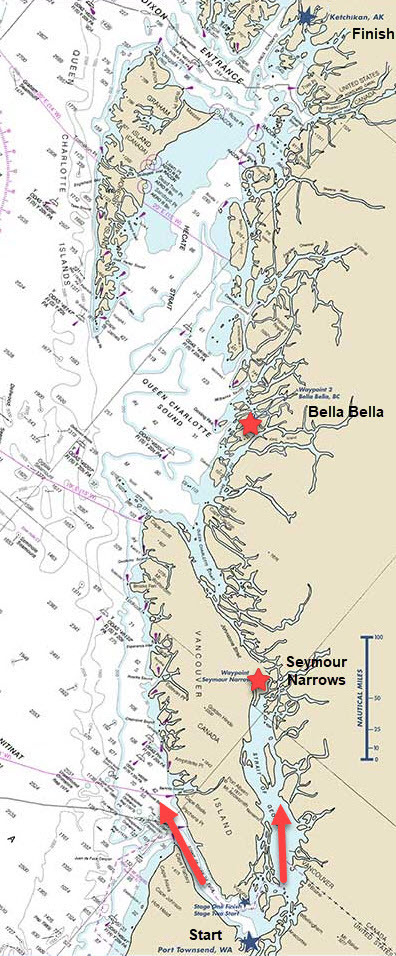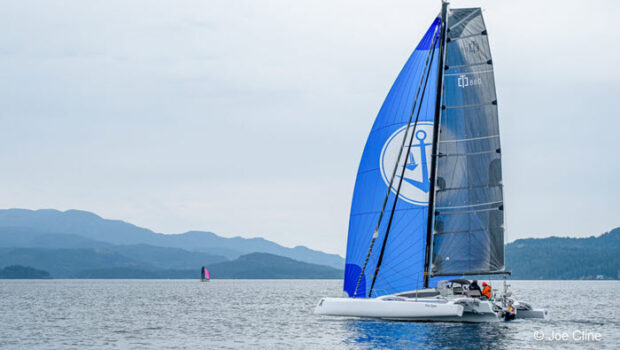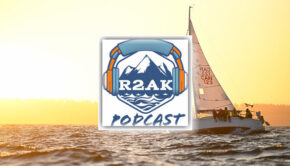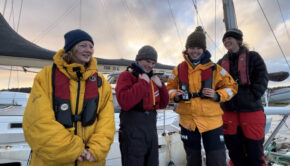R2AK: A Golden Corral buffet
Published on June 11th, 2023
The 7th edition of the 750 mile Race to Alaska (R2AK) began June 5 with a 40-mile “proving stage” from Port Townsend, WA to Victoria, BC. For those that finished within 36 hours, they were allowed to start the remaining 710 miles on June 8 to Ketchikan, AK. Here’s the Stage 2/Day 4 report:
Let’s get this out of the way: we give up.
Deep in the word mines of R2AK, we toil day and night to find the single narrative vein that can put all of this engine-less calamity into context. Threads of truth that we can weave into a rope of content and use to rappel you into the unsounded depths of the experience of Race to Alaska.
Today, we’re emerging to the surface with blunted pick axes, a smear of dust on our face, and the thousand-yard stare of too much time underground without hitting the motherlode. Today we’re showing up to scales with a pocketful of unrelated crystals that we’ll give fancy names, charge by the light of the full moon, and sell to tourists. R2AKinium, good for the liver, increasing blood pressure, and the need for adventure, and lowering expectations of news from the race.
Or something.
Getting closer to relevant, Race to Alaska’s third day was defined more by a divergence of everything than by the convergence on singularity. Instead, we offer a Golden Corral buffet. Eat all you like but save room, dessert’s at the end. (Spoiler alert: it’s pudding)
Theme 1: Leaders outpace the competition (for now)—At the front of the pack, the teams that punched through Seymour Narrows by the dark of last night mostly persevered against the milder-than-normal conditions of Johnstone Strait. Leaders of the moment, by midnight of Day 3 Team We Brake for Whales put a come-from-behind ten miles between themselves and the boat speed machine and rolling shakedown/ breakdown cruise that is Team Tres Equis.
At time of writing, they have rounded Cape Caution and are inbound to Bella Bella. Did we mention that they’ve overcome a 10+ mile deficit in the day and a half? Did we mention that they are also baking cookies, in their onboard oven? It’s not lost on us that they are winning to the scent of fresh baked cookies nearly a horizon ahead of the freeze-dried food teams that are chasing them.
Big, heavy boat with a crew of seven with massive R2AK and global big boat sailing cred? Conventional wisdom and every R2AK in history dictates that if they are first into the Bella Bella, they’re the statistical odds on favorite for the $10,000 nailed to the piece of firewood that we consider the Wagyu ribeye of the tree. Prove us wrong (yes, we’re talking to you, Tres Equis). It’s still anyone’s race.
Theme 2: The French: victoires et défaites—First and foremost, let us all remove our collective chapeaus and sing an enthusiastic but poorly pronounced rendition of the French national anthem. The land of eponymous bread and toast has much to celebrate and grieve this morning.
The solo roving, French and Jedi excellence of Team Pestou continues to impress at levels that exceed the honors of an Olympic podium. After two days of out-sailing the pack on 30 minutes of sleep in the preceding 30 hours, Eric Pesty turned in—and not a well deserved towel throw—so he could exit the race and sleep a solid night in a real bed.
After 30+ hours of solo sailing Team Pestou turned into Seymour Narrows in the near midnight starless night and kept sailing to maintain his incredible position. At time of writing, he’d lost four positions while he slept, but was back to making miles in the fresh breeze of Queen Charlotte sound. Knowing him, he’ll be back in the hunt in no time.
In autre French news, the four French/Californian crew of Team Mojo sailed through Seymour Narrows then arrette-d. The reason they bowed out? “We looked at the forecast and saw that it is, not so good?” With storm clouds on the horizon and a damaged rudder, they headed for the barn. To make things relevant to both their Californian and French origin stories: Team Mojo’s Race to Alaska took slightly less time than their Bay Area commute and lasted slightly longer than the French did in World War Two.
Merde.
Prudence was the order of the day and they sailed south, downwind and on a following tide, running Seymour for the second time in 24 hours and heading back to the same pub they dined in the day before. Food must be good. Better news, we hear that Campbell River’s answer to the immortal French question “Ou est la bibliothèque?” is within walking distance. Mustering our best high school française: Bon anniversaire les enfants, ne me quitte pas. See you next année.
Theme 3: Human-powered craft, mon dieu.—Demonstrative ignorance of French aside, perhaps the most incredible story of Day 3 lies in the persistence of the solo human/horse-powered juggernauts of Teams SeaSmoke and Wave Forager. A scant 60 hours after Victoria’s high noon start, and our first solo and muscle-powered team is punching through the gates of Seymour, in the dark, and the chase is on with the water-frothing kayaking skills of Team SeaSmoke isn’t far behind, pushing through Seymour in the early morning light.
Holy sh#t and sacre bleu—the race is on.
Here in the story mines, we’re not big on facts or accuracy, but we are staunchly slightly more than pretty sure that this is the fastest passage for the water shoveling set in the history of R2AK—by far. And solo? We’re way more than pretty sure that both of them are smashing the record for human-powered progress to date, not to mention any and all expectations for what was previously defined as possible.
In late-breaking news, Team Hornblower sounded his retreat early Sunday with damage to his rudder and daggerboard, the latest casualty of British Columbia’s driftwood navy. Sure, unmanned Chinese spy balloons stole the headlines in 2023, but what mainstream media won’t tell you is that every year Canada releases countless unmanned logs into the Race to Alaska—things that go bump, and crunch, and profanity in the night.
Last year they took out a dozen teams on the lower part of the course. While there has been plenty of wood vs boat violence, as far as we know, this year Team Hornblower is the first verified win for the logs.
Daggerboards and rudders are to boats what exhaust ports are to Imperial Death Stars. They aren’t the biggest target for the logs, but it’s the one fault in the design that keeps getting exploited by the enemy. Without the things that stick down in the water, it’s hard to steer or do anything more than sail sideways. With 600 upwind miles in front still to go, best thing to do is pack it in.
It’s R2AK Day 4, 26 teams still racing (and whatever Lillian is doing). Leaders are sailing in unprotected waters into a stiff breeze, our guess is that if conditions hold and they can dodge the logs it’s Bella Bella today, Ketchikan sometime on the 13th. Or not. Check back with us after they get there.
R2AK—out.
(There is actually no pudding. Sorry.)
Race details – Entry list – Tracker – Facebook
 The 7th edition of the Race to Alaska in 2023 will follow the same general rules which launched this madness in 2015. No motor, no support, through wild frontier, navigating by sail or peddle/paddle (but at some point both) the 750 cold water miles from Port Townsend, Washington to Ketchikan, Alaska.
The 7th edition of the Race to Alaska in 2023 will follow the same general rules which launched this madness in 2015. No motor, no support, through wild frontier, navigating by sail or peddle/paddle (but at some point both) the 750 cold water miles from Port Townsend, Washington to Ketchikan, Alaska.
To save people from themselves, and possibly fulfill event insurance coverage requirements, the distance is divided into two stages. Anyone that completes the 40-mile crossing from Port Townsend to Victoria, BC can pass Go and proceed. Those that fail Stage 1 go to R2AK Jail. Their race is done. Here is the 2023 plan:
Stage 1 Race start: June 5 – Port Townsend, Washington
Stage 2 Race start: June 8 – Victoria, BC
While the Stage 1 course is simple enough, the route to Ketchikan is less so. Other than a waypoint at Bella Bella, there is no official course. Whereas previous races mandated an inside passage of Vancouver Island via Seymour Narrows, the gloves came off in 2022. For teams that can prove their seaworthiness, they now had the option of the western route.
There is $10,000 if you finish first, a set of steak knives if you’re second. Cathartic elation if you can simply complete the course. R2AK is a self-supported race with no supply drops and no safety net. Any boat without an engine can enter.
There were no races in 2020 and 2021 due to the pandemic. In 2022, there were 45 starters for Stage 1 and 34 finishers. Of those finishers, 32 took on Stage 2 of which 19 made it to Ketchikan.
Source: R2AK







 We’ll keep your information safe.
We’ll keep your information safe.